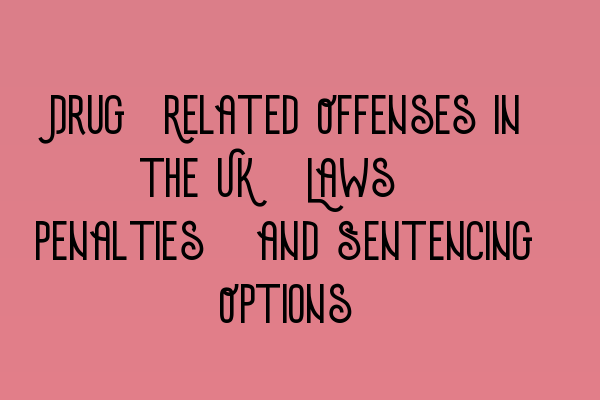Drug-Related Offenses in the UK: Laws, Penalties, and Sentencing Options
Welcome to SQE Criminal Law & Practice Law UK, your trusted solicitors specializing in criminal law. In this blog post, we will shed light on drug-related offenses in the UK, including the laws governing them, the penalties they carry, and the available sentencing options.
The Law on Drug-Related Offenses
In the UK, drug-related offenses are governed by the Misuse of Drugs Act 1971. This comprehensive legislation categorizes controlled substances into different classes based on their potential for harm and misuse.
If you or someone you know is facing charges related to drug possession, drug supply, or drug production, it is crucial to understand the specific laws that apply to your case. Our solicitors specialize in defending individuals facing drug-related charges, ensuring their rights are protected and providing expert legal representation.
Penalties for Drug Offenses
The penalties for drug offenses in the UK vary depending on the severity of the offense and the class of the controlled substance involved. For lesser offenses, such as possession of small quantities of a Class C drug, individuals may face a warning or a simple caution. However, more serious offenses, such as drug trafficking or production, can result in significant fines and lengthy prison sentences.
If you have been charged with a drug-related offense, it is essential to seek professional legal advice promptly. Our experienced solicitors have a deep understanding of drug offense laws and can provide expert guidance tailored to your specific situation.
Sentencing Options
When it comes to drug-related offenses, courts have a range of sentencing options available, which aim to rehabilitate the offender, protect the public, and deter future drug-related activities.
These sentencing options may include:
- Community Orders – A community order requires the offender to complete specific requirements, such as attending rehabilitation programs, community service, or drug rehabilitation courses.
- Suspended Sentences – In some cases, the court may choose to suspend a prison sentence, subject to certain conditions. This allows the offender to remain in the community while being supervised and avoids immediate incarceration.
- Prison Sentences – For more serious drug offenses, the court may impose a prison sentence to reflect the gravity of the offense and protect the public.
It is worth noting that sentencing decisions are highly dependent on the individual circumstances of each case. Our solicitors are well-versed in presenting strong mitigating factors to reduce the potential penalties imposed by the court.
At SQE Criminal Law & Practice Law UK, we strive to provide expert legal advice and representation for individuals facing drug-related offenses. If you require assistance or wish to learn more about drug offenses in the UK, please do not hesitate to contact us.
Related Articles:
